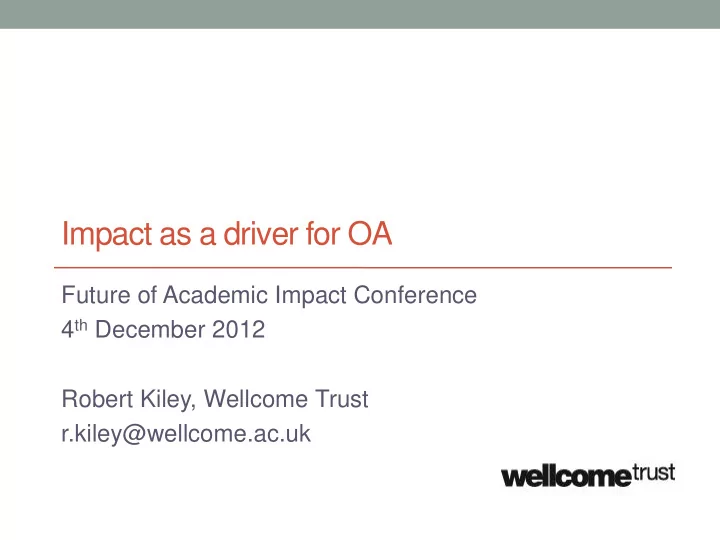

Impact as a driver for OA Future of Academic Impact Conference 4 th December 2012 Robert Kiley, Wellcome Trust r.kiley@wellcome.ac.uk
Overview • Brief overview of how Wellcome Trust undertakes evaluation • Look at development of OA policy as a driver for impact • Discuss OA and impact
" Our discovery of DNA fingerprinting was of course totally accidental … but at least we had the sense to realise what we had stumbled upon." Sir Alec Jeffreys, inventor of DNA fingerprinting which has revolutionised forensic science & the criminal justice system
The long road to discovery early 1960s In vitro fertilisation (IVF) 1978 18 years between Robert Edwards first cultivating & maturing human eggs in the lab & first test tube baby being born early 1970s Monoclonal antibodies early 2000s 30 years between Milstein & Kohler manufacturing first monoclonal antibodies & widespread adoption in therapies
Monitoring progress: WT’s key indicators Outcomes Key indicators of progress Discoveries significant advances in the generation of new knowledge 1. contribute to discoveries with tangible impacts on health 2. contribute to the development of enabling technologies, Applications 3. products and devices uptake of research into policy and practice 4. enhanced level of informed debate in biomedicine 5. Engagement significant engagement of key audiences & increased reach 6. develop a cadre of research leaders Research leaders 7. evidence of significant career progression among those we 8. support key contributions to the creation, development and 9. Research maintenance of major research resources environment contributions to the growth of centres of excellence 10. significant impact on science funding & policy developments 11. Influence significant impact on global research priorities and processes 12.
Volume and normalised citation impact of Wellcome Trust-associated papers 2006-2011 Normalised citation impact – annual average (line) Number of papers published (bars) Data: Thomson Reuters 2012
OA and impact: why did the Trust develop an OA policy? • “ Access denied” – trigger event • Primary aim: to maximise return on our investment • i n line with Trust’s mission • encourage others to build on the research we have funded • funding the research is a job only part done – a fundamental part of funders’ missions is to ensure the widest possible dissemination and unrestricted access to that research
OA and impact: a clear relationship from the start
Wellcome Trust spend on OA Total Open Access Expenditure 2005/06 to 2011/12 Includes Open Access Block Grants and Supplementations Grand Total Open Access £5,000 £4,500 £4,000 £3,500 Value £'000 £3,000 £2,500 £2,000 £1,500 £1,000 £500 £0 2005/06 2006/07 2007/08 2008/09 2009/10 2010/11 2011/12 Financial Year
OA Impact – greater usage (at least downloads) • Studies have demonstrated that OA articles are downloaded more than non OA articles • Articles placed in the open access condition received significantly more downloads and reached a broader audience within the first year…than subscription-access control articles . [Davis: http://dx.doi.org/10.1096/fj.11-183988 ] • Jury still out on whether OA leads to greater citations • Eysenbach: The average number of citations of OA articles was higher compared to non-OA articles http://www.ncbi.nlm.nih.gov/pmc/articles/PMC1459247/ • Davis: Thirty six months after publication, OA articles were cited no more frequently than articles in the control group. No significant citation differences were detected at 12, 18, 24, and 30 months after publication. http://www.bmj.com/content/341/bmj.c6854
OA Impact – reuse
Open access – policy requires CC-BY • OA policy now specifies that research, for which an OA fee is paid, must be licenced using CC- BY • Trust believes that full research and economic benefit of published content will only be realised when there are no restrictions on access to, and reuse of, this information • Will introduce this requirement from April 2013 • Working with RCUK on this requirement
CC-BY has potential to increase reach (impact) of our research • “Heineken effect” • Trust-funded research can be “promiscuous” and be made available from multiple locations, reaching parts other researcher can’t reach • New, derivative works can be created • Translations, lay summaries, wikiepedia entries • New knowledge as a consequence of text-mining • Commercial exploitation possible http://www.fotopedia.com/items/flickr-2228066149 CC-BY-SA)
Trust exploring value of “alt - metrics” • WT have always stated that it is the “intrinsic merit of the work, and not the title of the journal in which an author's work is published, that should be considered in making funding decisions” • Growing support for Article level metrics
Conclusion • Increasing the impact of our research was a key factor in developing OA policy • OA articles are already being downloaded (and read?) more than non-OA • OA research can be re-used, thus further increasing its reach • To maximise impact of your research, make it OA
Recommend
More recommend